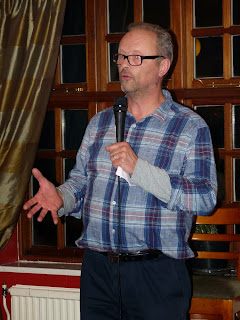 After having to postpone
last month BBC Journalist John Sweeney joined us at The White Horse for what
turned out to be a devastating denunciation of Scientology mixed with a boozy
swear word scripted pantomime.
After having to postpone
last month BBC Journalist John Sweeney joined us at The White Horse for what
turned out to be a devastating denunciation of Scientology mixed with a boozy
swear word scripted pantomime.
John proved that his
in-your-face style of reporting isn't just for the TV screen by
telling the audience that Bedford felt like the North Korean capital Pyongyang in
that "it has a sense of itself, but is not just quite right."
 John made it clear that any
views he expressed during the talk were his alone and nothing to do with the BBC
or the Director General ("whoever that may be this week") and that to avoid any litigious
John made it clear that any
views he expressed during the talk were his alone and nothing to do with the BBC
or the Director General ("whoever that may be this week") and that to avoid any litigious
Scientologist lawyers we should point and shout "Bigot! Bigot! Bigot!"
at him. This humble blogger did so and if you point and shout
"Bigot!" at your screen whilst reading this entry then we should all be
safe from any legal entanglements.
With audience members
taking on the parts of, amongst others, John Travolta, Tom
Cruise and L. Ron Hubbard and repeating some of their
more seemingly outlandish statements on the subject of Scientology it
would have been easy to feel that this was just an evening of easy
ridicule. However, John's central message is that Scientology is a
dishonest money making scheme that divides families and displays all the
characteristics of a cult rather than a legitimate religion.
He maintains that he
defends people's right to believe in anything they wish. But, unlike
established religions, Scientology isn't up front about the
basic tenets of its 'faith'. Whether you believe it or not Christianity is
quite clear that they believe
Jesus was the son of god who died for our sins,
then rose again.
 Islam is clear that Muhammad is the last prophet of god
and Allah is that god. However, with Scientology you have to spend a great
deal of time and money to actually discover that the basic belief of Scientology
is that you are actually possessed by the spirits of dead aliens that were murdered with H-bombs by an evil intergalactic overlord.
Islam is clear that Muhammad is the last prophet of god
and Allah is that god. However, with Scientology you have to spend a great
deal of time and money to actually discover that the basic belief of Scientology
is that you are actually possessed by the spirits of dead aliens that were murdered with H-bombs by an evil intergalactic overlord.  There were plenty of fans of John's work in the audience who were vocal in their appreciation his talk. But also plenty of people who felt that they wanted more history of how Scientology came into being and how exactly any criticisms of these beliefs cannot be levelled equally at other religions. However, the focus of John's talk wasn't about the weird belief system of Scientology but instead the way that it operates a regime of secrecy and intimidation.
There were plenty of fans of John's work in the audience who were vocal in their appreciation his talk. But also plenty of people who felt that they wanted more history of how Scientology came into being and how exactly any criticisms of these beliefs cannot be levelled equally at other religions. However, the focus of John's talk wasn't about the weird belief system of Scientology but instead the way that it operates a regime of secrecy and intimidation.
Hence, the title of the book that accompanies the talk - 'The Church of Fear'.
Whatever your opinion of the talk, it was certainly a lively, combative night of robust conversation and debate.
NEXT TIME: No Skeptics In the Pub event in December. But please join us again on Thursday 16th January when Stevyn Colgan (from the BBC show 'Q.I.') will be talking to us about grass-roots skepticism and why we should be critical thinkers in every aspect of our lives. Full details HERE.



































